Tree House Plans Drawing Detaiks
Architects: Showcase your next project through Architizer and sign up for our inspirational newsletter .
For the majority of buildings, architecture begins on the ground. But buildings continue to rise with our ambitions, and every bit we've created skyscrapers soaring thousands of feet and supertalls that reach toward the stratosphere, we continue to look up. At a more intimate scale, treehouses reflect an innate desire for reflection, as well as new views and vantage points. As architects build off the ground, their designs are are removed from the conditions below and lent a newfound flexibility, freed from the usual constraints.
Celebrating dwellings that rise in a higher place, the following drove of projects features retreats and homes designed around treetops and forests. Sited beyond five continents, the designs showcase a global fascination with treehouses and the outdoors. Explored through department drawings, the drove shows how buildings are removed from the ground and how they are placed in relation to the surrounding landscape. Together, they give a glimpse into dissimilar ways of living with nature and embracing broader contexts.

 Tree House past Van der Merwe Miszewski Architects (VDMMA), Cape Town, South Africa
Tree House past Van der Merwe Miszewski Architects (VDMMA), Cape Town, South Africa
Windows & Fenestration by ASI Limited, Lighting by Crenshaw
This house was designed on the slopes of Table Mount in Cape Town around a want for contextual responsiveness and connectivity. The site, adjacent to a valley and stream, has a canopy of spreading umbrella Pines. These trees, royal and sculptural, provided the primary reference and ultimately the structural concept for the house. Five tree-like structures ballast the roof to the ground and provide shelter for the functions gathered nether. These trees are surrounded past an entirely split up lightweight transparent steel and drinking glass enclosure supported on a heavily rusticated stone base of operations.
The design of the house incorporates themes of narrative, of layering and of expressed threshold. The visitor is invited to take part in a journey of discovery, requested to participate in the unlocking of experiences within the house, the unpeeling of layers. VDMMA tried to enhance the feel of unveiling and of delicate exposure, to create within the business firm sensuality and moments of intense intimacy – a folly immersed in, and closely linked with, the beauty of the African landscape – a simultaneous dialogue between inside and outside and outside and inside, neither taking precedent over the other.

 Tree Houses past Peter Pichler Architecture, Northward Italian republic
Tree Houses past Peter Pichler Architecture, Northward Italian republic
PPA developed a concept for sustainable tree houses in the forest of the Italian Dolomites. The tree houses are an add-on to an existing hotel and are made to create a new experience of living in the woods with maximum connection to nature. The geometry features sharp steep roofs inspired by the surrounding fir and larch trees, and they volition be made of local forest. The size of the units ranges from 35-45 m2 on ii levels. The lower level is a small reading / lounge area, and the upper level the sleeping area with a small bathroom. The two levels are connected with a small internal stair.
The project is conceived equally a "wearisome down" — a grade of tourism where nature and the integration of architecture in information technology plays a master role. As the office said, "We believe that the futurity of tourism is based on the human relationship of the homo beingness with nature. Well integrated, sustainable architecture tin amplify this relationship, cypher else is needed." In the section y'all get a sense of structure and living quarters, also as the vertical circulation.
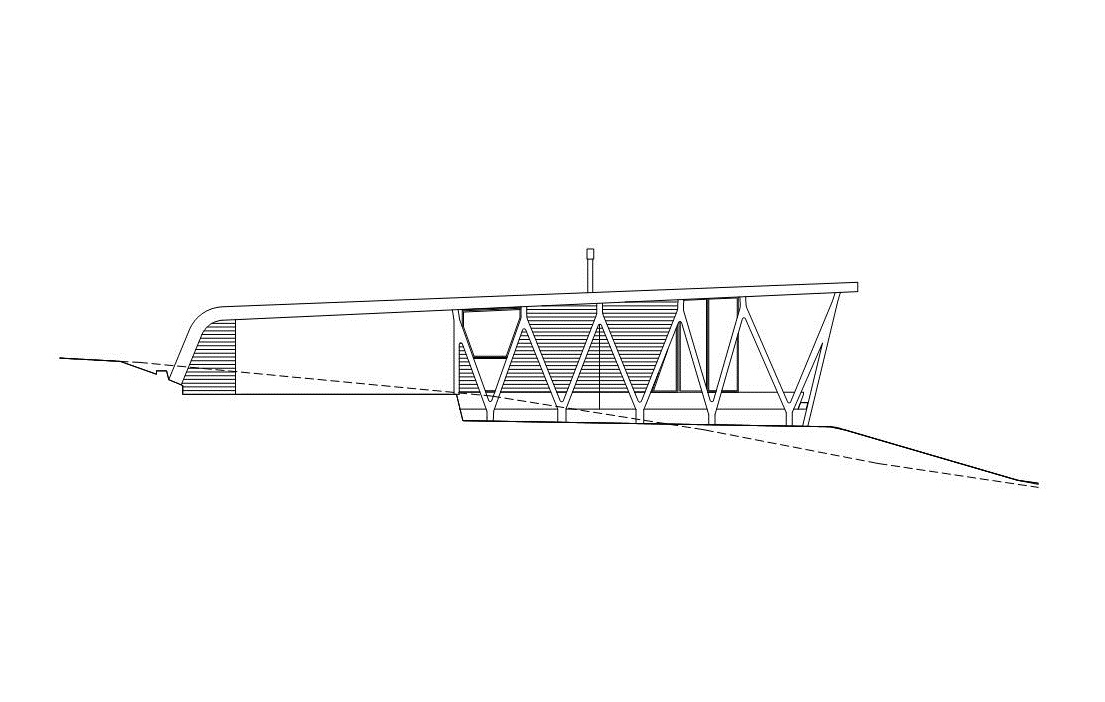
Trunk Firm by Paul Morgan Architects
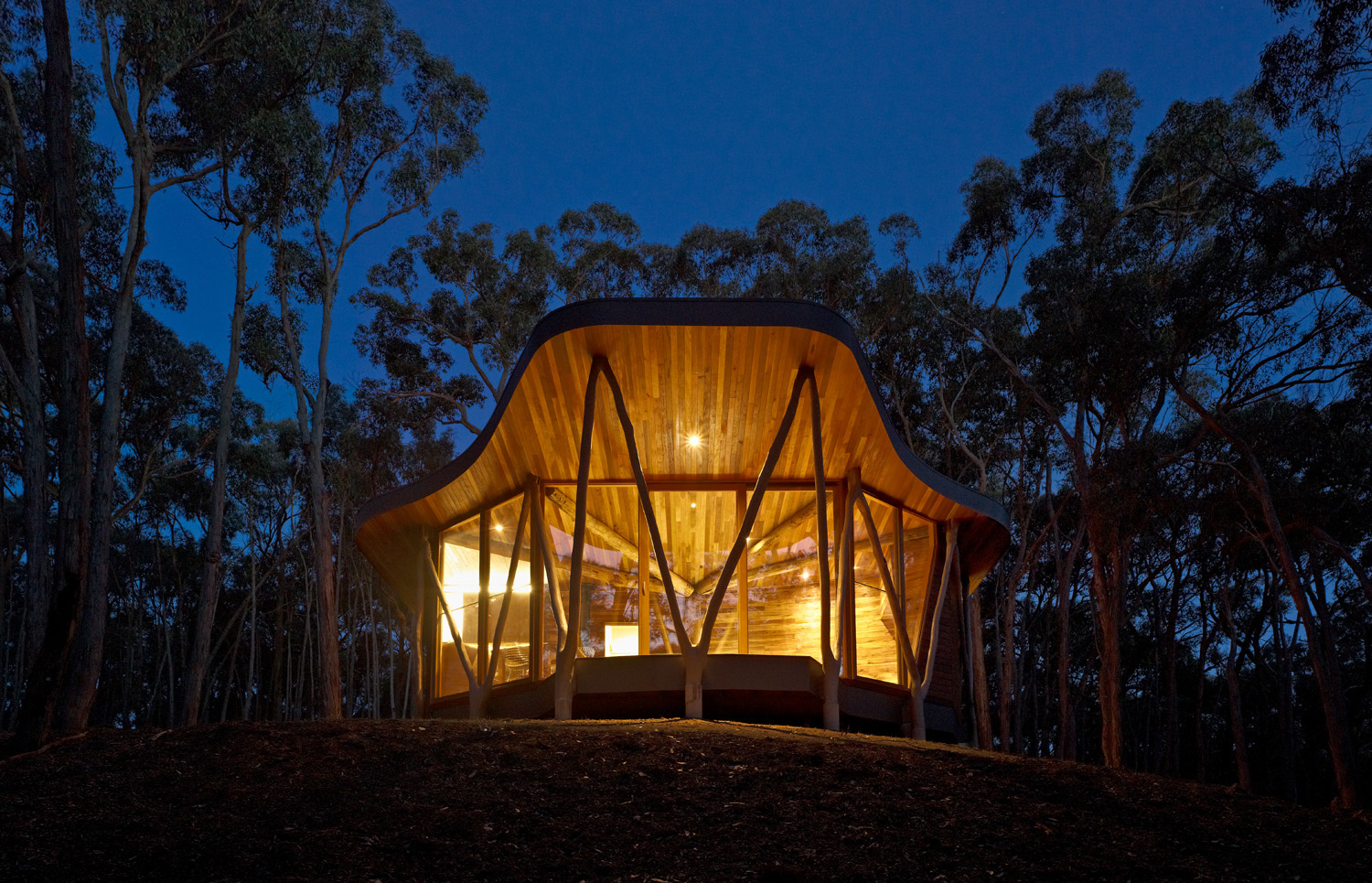 Trunk House by Paul Morgan Architects, Highlands, Australia
Trunk House by Paul Morgan Architects, Highlands, Australia
Roof & Ceilings byDulux, Forest Floor by Intergrain
Body Firm was designed effectually one question; how does one become into a forest and use the forms of the environmental to build a house? The project is a small cabin in Victoria's Central Highlands. The brief included a living area, small kitchen, bath and two bedrooms. The clients asked for a small habitat that could connect them with the isolation one finds in a wood, as well equally closeness to the birdlife. Tree forks or bifurcations were used equally the construction for the cabin. The bifurcations were sourced from forest floors and farmland, and, due to their age, were well seasoned. They were joined to straight columns with internal metal plates by a sculptor.
An internal cavalcade with radiating beams completed the structure. Stringybark trees were removed from the site to make mode for the new house. A mobile milling machine was delivered to site, and the lining boards were milled, cured on site, and and then fixed internally. The figuration of the boards in the living room results in a minimal carbon footprint for the sourcing and installing of the lining boards. The pattern sought to achieve an almost transparent relationship with the surrounding wood, achieved through an eco-morphological transformation of remnant timber into structure. Information technology developed the typology of the small Australian house, conflating it with the precedents of the primitive hut and the tradition of Aboriginal structures.

 Tree Snakes House by Luís and Tiago Rebelo de Andrade, Braga, Portugal
Tree Snakes House by Luís and Tiago Rebelo de Andrade, Braga, Portugal
The projection for these houses was developed in partnership with the Modular System Company. The thought was to go an object that would be far away from orthogonality and pre-established concepts associated with the modular structure. The pattern associated with the slates and the forest on the base suggests a snake gliding between the copse. The choice of materials gives a sense of connection with nature and establishes a coherent image of a symbiosis between the house and the Park. The architects made use of new technology already tested in prototypes that allowed an piece of cake-conveying construction.
Native raw material, slate and wood used in the finishing promoted integration into the centennial park itself. The consistency and rationale for the intervention were attained by the layers of reinforced insulation, heating systems, water reuse, water solar panels, the depression consumption lighting organization using LED engineering as well as the option of keeping the soil without any impermeable arrangement. Each firm comprises a studio with a bathroom and a kitchen. The two Tree Snake Houses of Pedras Salgadas Park are objects that, using similar materials and technologies, point out to our imaginary: the primitive hut and the wild animal.
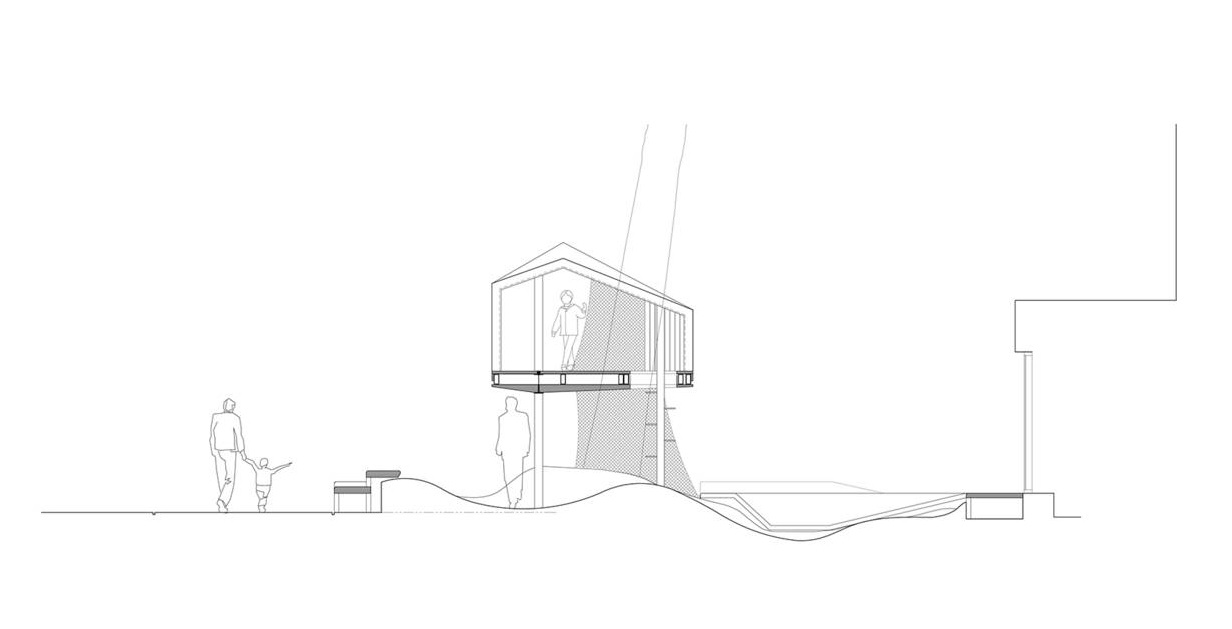
 IMJ Tree Firm by Ifat Finkelman & Deborah Warschawski, Jerusalem, Israel
IMJ Tree Firm by Ifat Finkelman & Deborah Warschawski, Jerusalem, Israel
Structural Frames & Systems by Bazelet
The entrance courtyard of the Youth Wing for Art Education at the Israel Museum, Jerusalem (IMJ) is a main gathering identify for visitors- adults, children and groups. This project – a renewal of the courtyard – combines a program open up to interpretation by its users with a clearly defined context. The existing pine tree is the focus of the project, the physical anchor of the pattern concept. Every bit a tribute to the childhood collective retention of a tree house, a pocket-sized roofed structure where children can hibernate and over wait at, is positioned high upward the tilted trunk, raised above the environment of the museum. Along with its stiff iconic appearance, it too functions as the peak of one continuous structural folded element assuasive various situations to occur along it.
The structural technique- 2 cm Ipea boards stock-still to a low-cal steel skeleton – creates a range of transparencies from pinnacle to bottom. While gradually transforming towards the ground, the chemical element'southward surface becomes a playground; sitting elements frame a topography covered with a soft EPDM rubber surface. All this carefully hides the underground infrastructure configuration as well as a widespread root system. At night the house is the but element illuminated, and emerges floating above the courtyard'south entrance.
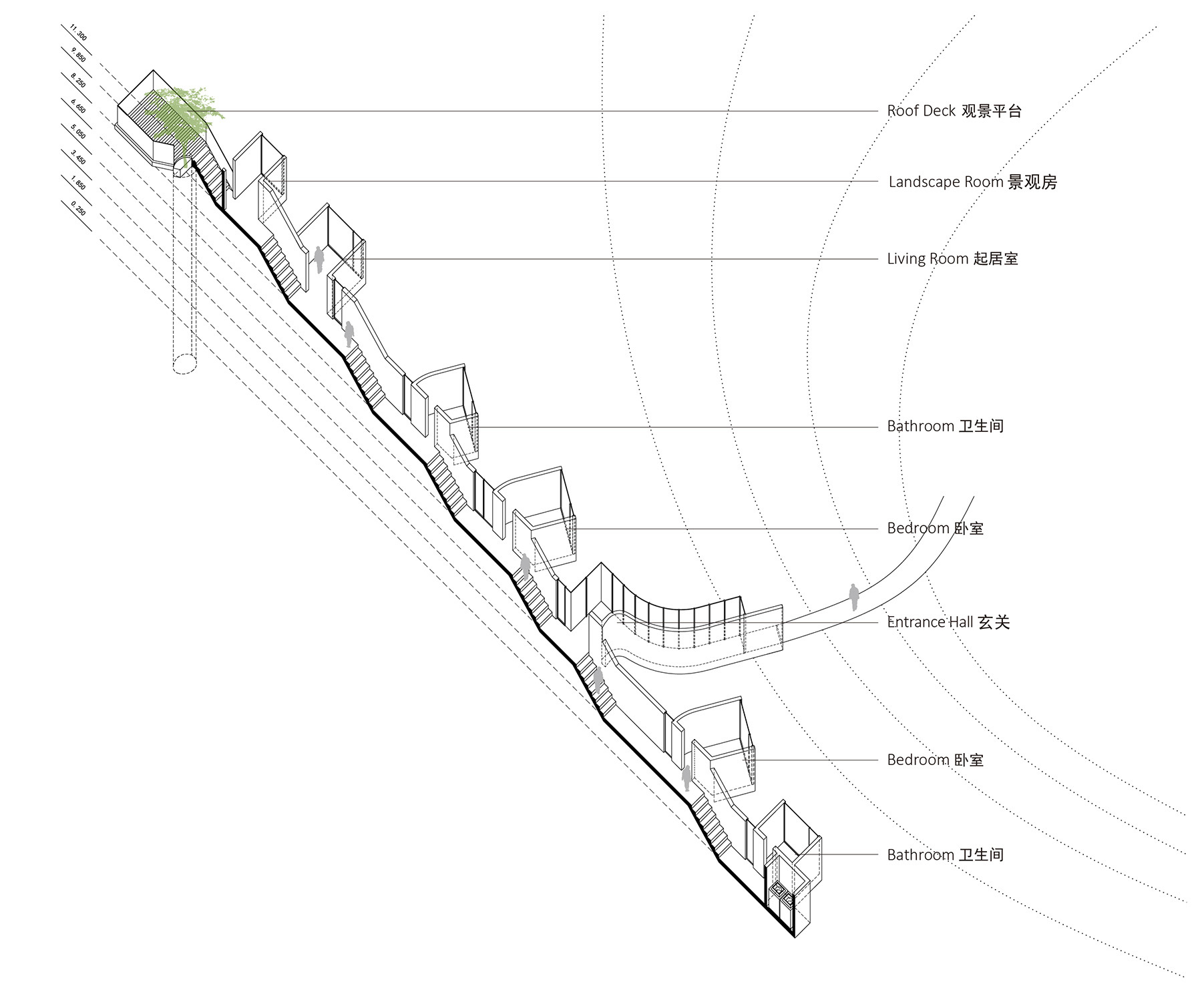
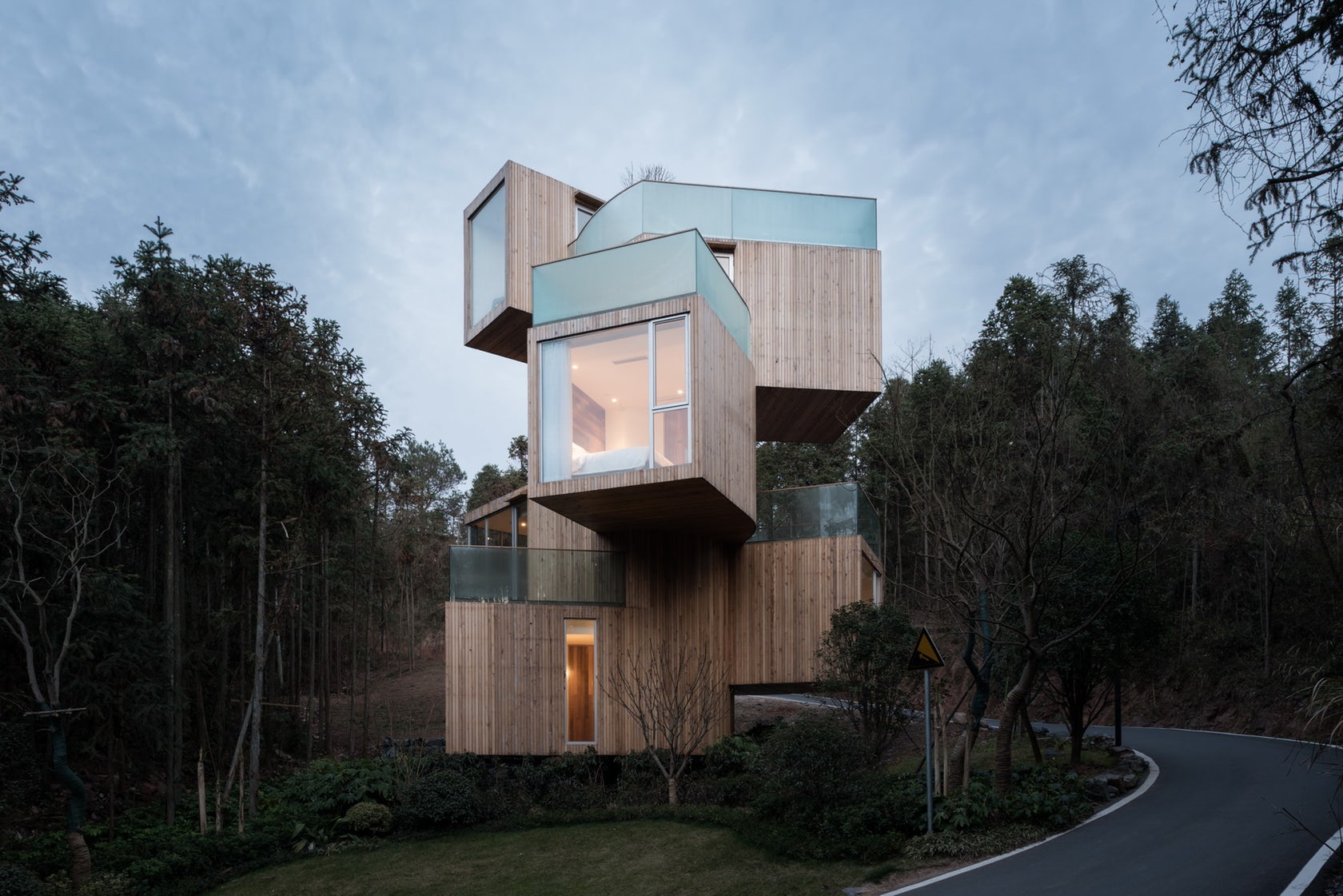 Qiyunshan Tree Business firm by Bengo Studio, Anhui, China
Qiyunshan Tree Business firm by Bengo Studio, Anhui, China
Lighting by Crenshaw, Seating by Martin Brattrud
This tree house is located in Xiuning County, 33 kilometers west of Huangshan Metropolis, Anhui Province, China. Information technology is part of the Qiyun Mountain Scenic Area. The total surface area of its larger context is 110 square kilometers. The breathtaking park is famous for its mountains, water, and caves. The project was designed as a land hotel with two bedrooms, ii bathrooms, one living room and ane landscape room (the room on the peak). All the rooms are connected via a spiral stair. At 120sqm, the projection was conceived equally a hut on the mountainside.
Visitors enter the tree firm along a middle corridor that connects to the larger project. Residents arrive at each room by climbing a screw staircase. The functional tiptop of each room was set at ane.6 meters, and these connect to features such as a porch, living room, bedroom, bathroom, viewing room, and viewing platform. Visitors and residents can experience the 360-degree view of the woods and experience their environs from different heights.
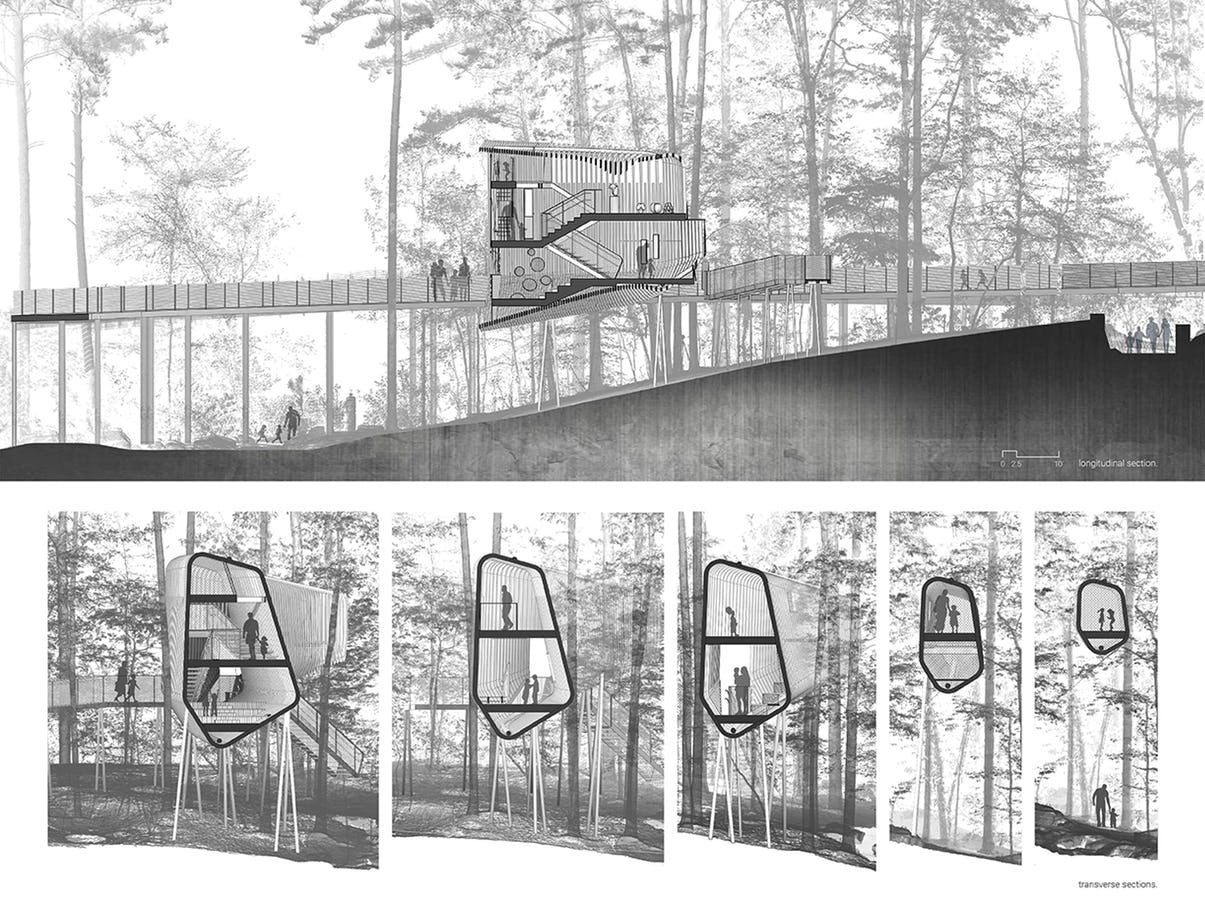
Section cartoon by modus studio
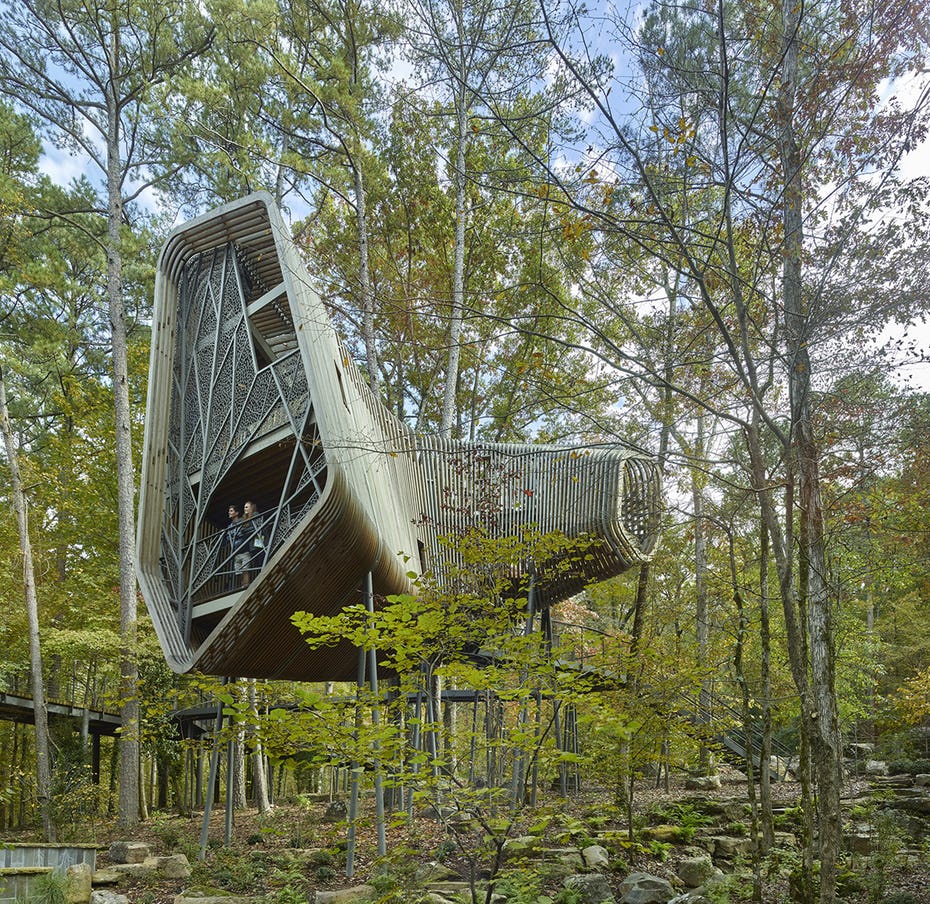 The Bob + Sunny Evans Tree Business firm past modus studio, Hot Springs, AR, United States
The Bob + Sunny Evans Tree Business firm past modus studio, Hot Springs, AR, United States
Nestled in a natural Ouachita Mountain hillside along Lake Hamilton at Garvan Woodland Gardens in Hot Springs, Arkansas, the Evans Children's Adventure Garden welcomed a new tree firm to the grounds in summer of 2018. As modus states, the tree business firm is the get-go of three planned for the garden that volition provide an interactive educational feel for visiting children as function of an ambitious program to bring children back into the forest. The tree house uses a rich visual and tactile environment to stimulate the mind and body to strengthen connections dorsum to the natural earth, while all-around the needs of all users.
The underlying theme of dendrology, the study of copse and wooded plants, drives both the form and programme of the construction. The 113 fins comprising the thermalized Arkansas-sourced Southern Yellow Pino screen creates a semi-transparent and an evocative form dynamically shrouding multiple levels of spaces for children and adults akin that refocus attending to the natural wonders of the forest canopy. The mysterious class, artistic play of shadow and light and sound, exploration of material, and take a chance that the Tree House provides creates a new experience within the Ouachita Forest among native pines and oaks.
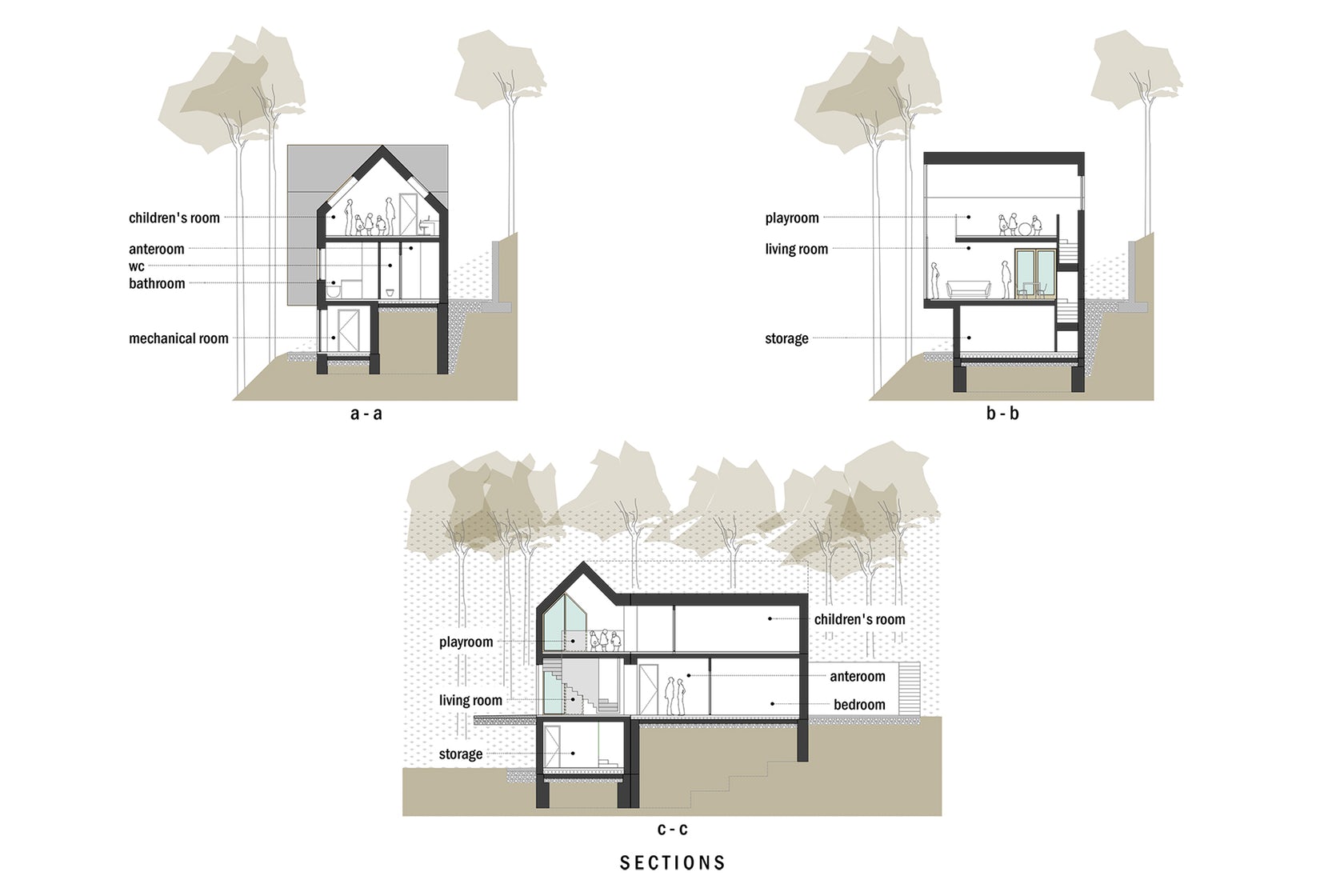
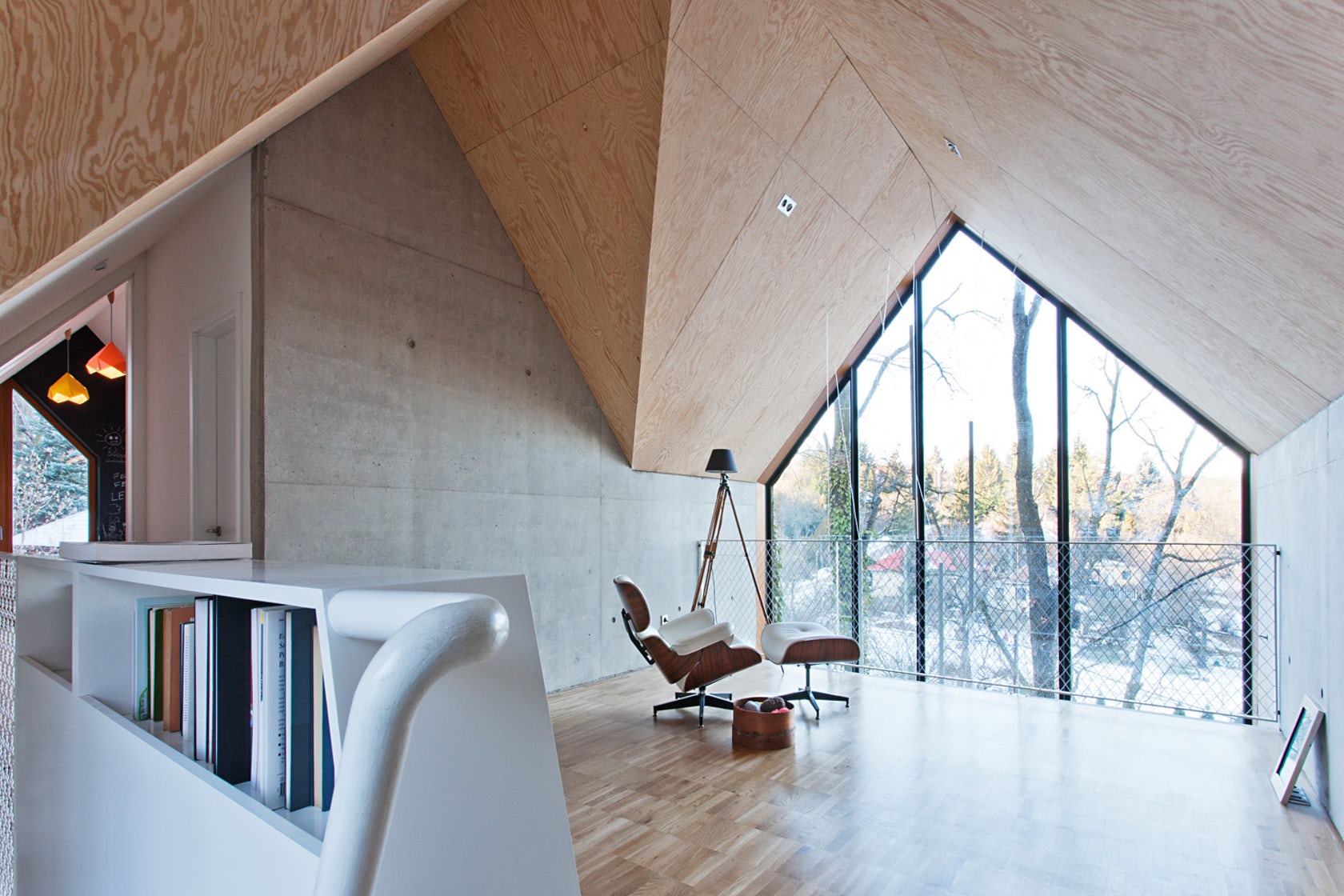 Firm in the Tree Crown by Nanavízió, Budapest, Hungary
Firm in the Tree Crown by Nanavízió, Budapest, Hungary
Metal Siding by RheinZink, Lamps by Lumoconcept
Nanavízió made its debut with this minimalistic, low-cardinal unmarried family home that hides among the ancient copse of the surrounding woods. The steeply sloping wooded lot was a main claiming for the project, simply information technology also inspired the architects to incorporate the trees into the design. Cheers to those steep slopes, the canopies of the lower garden's trees run forth the windows. The tall oaks, chestnut and pino trees comprehend the house and bring nature correct to the doorstep.
The volume of the house is made up by two different blocks fitted together in a xc° angle: the solid blackness cake is complemented by a metal covered two story cake with large glass surfaces. The interior's hard exposed concrete surfaces are softened past the light colored plywood panels that appear thorough the firm. The natural light is generously provided by the two-story glass wall that faces the n gradient and the canopy of the trees in the wood.
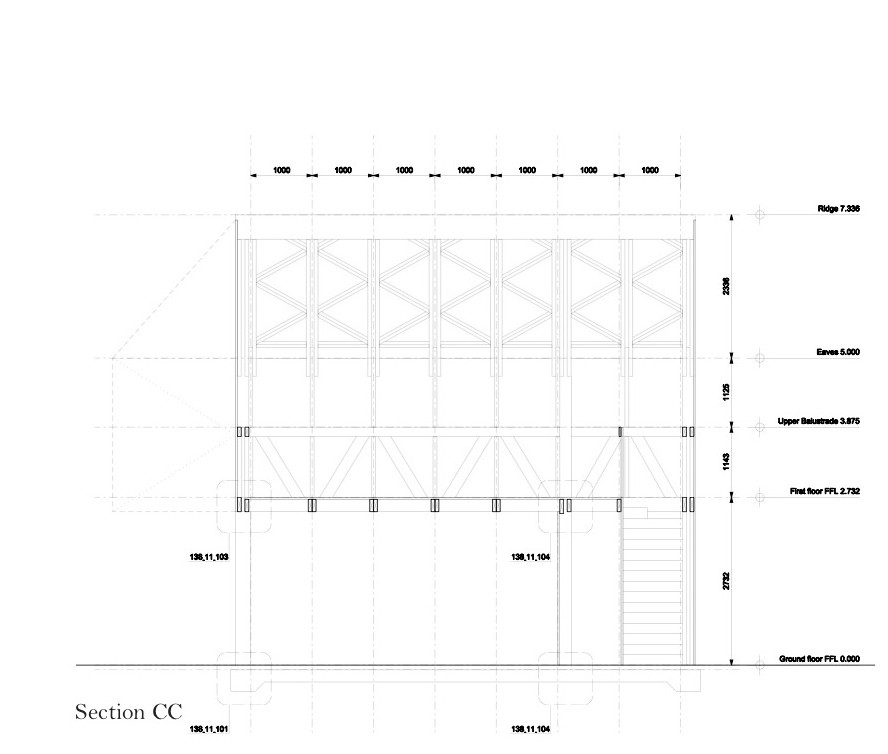
Department drawing past Studio Weave
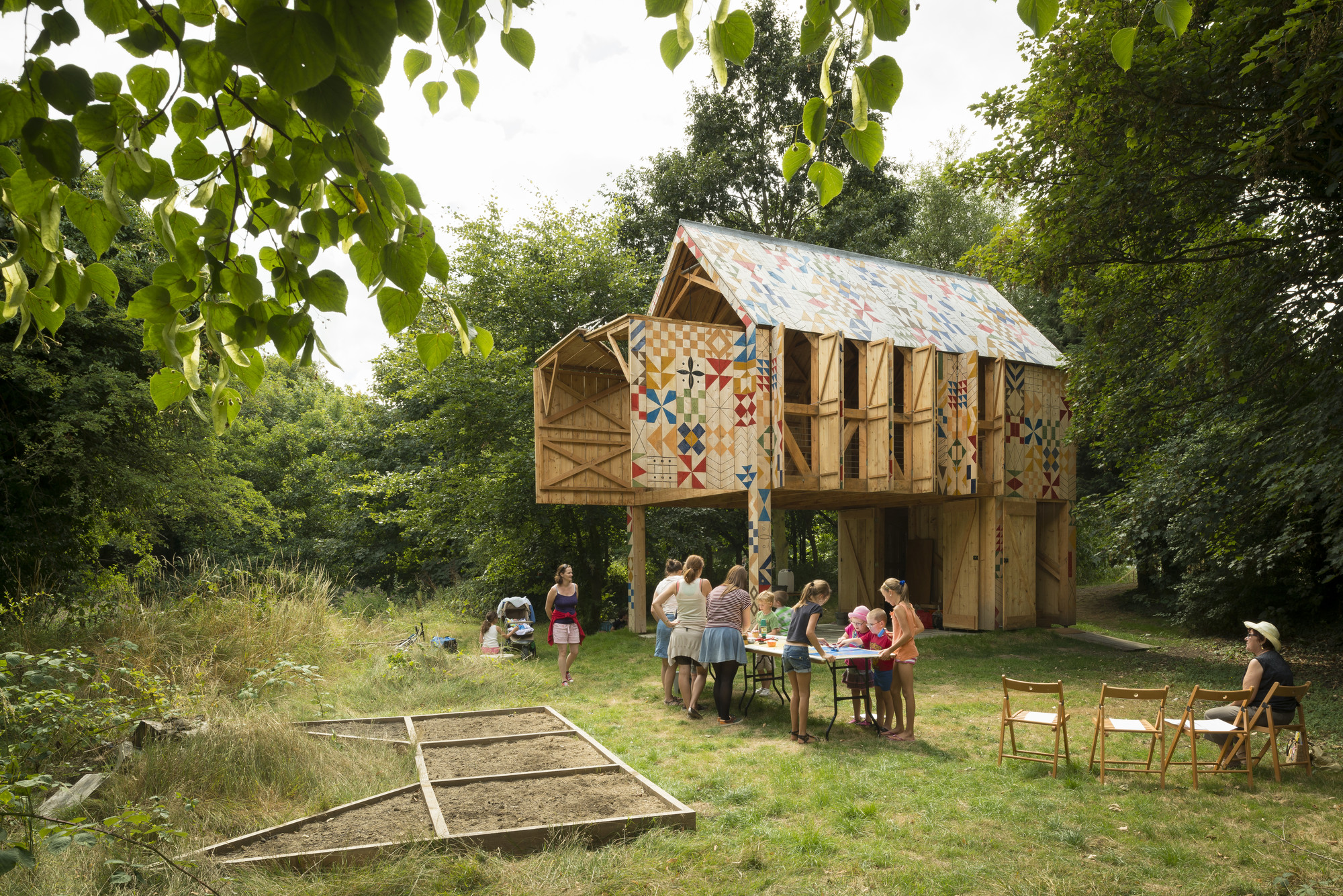
Photography by Jim Stephenson
Ecology of Colour by Studio Weave, Dartford, United kingdom of great britain and northern ireland
Ecology of Color brings public function to a neglected corner of Dartford by acting as a custodian for the re-imagined Ecology Island in Central Park. The timber construction is a community arts studio, bird-watching hideaway and park shelter all rolled into one. There is a semi-outdoor tiled classroom and storage space at ground level with an enclosed room upstairs offering views of the River Darent and surrounding copse. On the upper floor, shutters of diverse sizes permit for activities ranging from hidden wild animals watching and drawing, to public events that spill out into the park.
The creation of 2 intertwined cycles guided the project: the process of extracting colour dyes and using them for crafts, and the wildlife these plants attract including insects and birds. British timber is the predominant building material with Larch used for the structural frame while the cladding is made from Cedar. The Cedar cladding is stained with a pattern chosen 'Joy', designed by graphic designers Nous Vous. Prior to its installation, Nous Vous ran a series of workshops with a team of local residents and artists to paint all of the 144 panels, which form the external cladding. One of the nigh ambitious aspects of the blueprint'south structure is the hinged 'bill' opening on the upper floor, where the entire wall on the east elevation opens in i fell swoop through a uncomplicated pulley arrangement. When the beak is open it gives the effect of being upwardly in a treehouse amidst the awning, with views of the river swirling past.
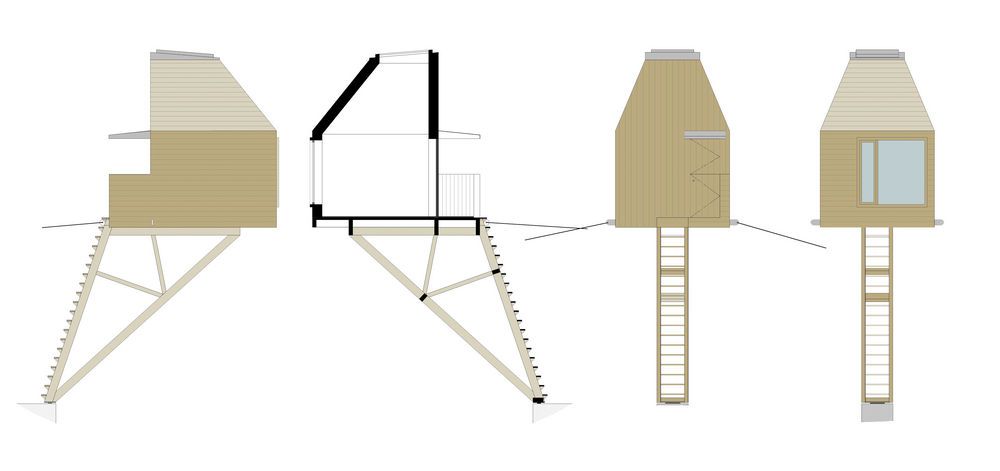
Outlandia Fieldstation by Malcolm Fraser Architects
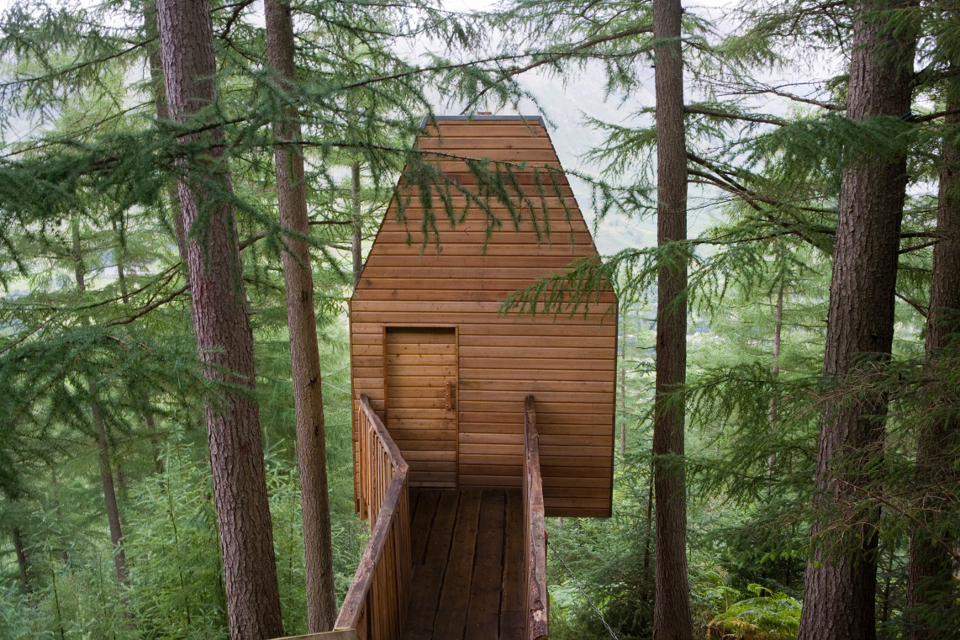 Outlandia Fieldstation by Malcolm Fraser Architects, Glen Nevis, Scotland
Outlandia Fieldstation by Malcolm Fraser Architects, Glen Nevis, Scotland
Designed as an artists' field station in Glen Nevis, this tree house encourages creative interaction betwixt artists and the country, its history and people. As the teams states, the choice of site grew out of "long crawls through moisture undergrowth and up wooded slopes, in clouds of midges and carpets of pino needles, in search of natural and human drama." Sitting half-way upward the opposite side of the Glen to Ben Nevis, a visitor approaches Outlandia along the path cut through the dumbo woods behind, descending out the musty dark of the trees into a big view which, from dark-to-light and framed by one-time, alpine larches, opens-upwardly across the Glen to the shoulder of the Ben.
The edifice itself sits out from a 45 degree slope: a treehouse, role-built out of the trees cut downwards to form the site, entered across a bridge from the slope backside; a elementary box, leaning-out into the view with a big window opening-up to it. Function of the process of building was low-touch, an eco-friendly use of cloth recovered from the site; function was the reverse, high-affect, with landings of physical for the foundations. The initial plan was for i twelvemonth, with artists using the treehouse every bit a base for creative interaction.
Discover More Architectural Drawings
Architects: Showcase your next project through Architizer and sign up for our inspirational newsletter .
All drawings and photographs courtesy of the architects.
Source: https://architizer.com/blog/practice/details/treetop-retreats/
0 Response to "Tree House Plans Drawing Detaiks"
Post a Comment